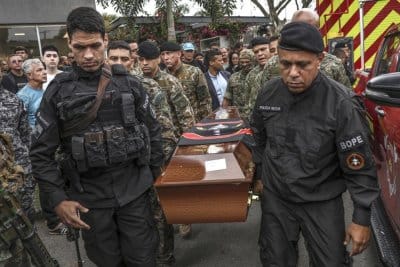
Members of the Rio de Janeiro Military Police attend the funeral of their colleague Sergeant Heber Carvalho da Fonseca at the Jardim da Saudade cemetery in Rio de Janeiro on Friday. Carvalho da Fonseca was one of four officers killed during clashes in the Penha favela complex during a police operation targeting drug traffickers, launched October 28. Photo by Andre Coelho/EPA
Oct. 30 (UPI) — President Luiz Inácio Lula da Silva has signed a new law that increases penalties and expands enforcement tools to combat organized crime in Brazil amid growing concern over violence in states such as Rio de Janeiro.
The measure, published Thursday in the Diário Oficial, imposes harsher penalties on those who obstruct investigations or collaborate with criminal organizations and provides greater protection for judges, prosecutors and law enforcement officers involved in such operations.
The legislation, which amends the Penal Code and the 2013 Law on Criminal Organizations, sets prison terms of up to 12 years for anyone who interferes with judicial proceedings or intimidates authorities. It also requires those convicted of these crimes to serve their sentences in federal maximum-security prisons.
The Brazilian government says the law strengthens the state’s ability to confront factions such as Comando Vermelho and Primeiro Comando da Capital, which are responsible for much of the country’s urban violence.
“We will not allow organized crime to continue oppressing communities and defying the Brazilian state,” Lula said during the signing ceremony at the Planalto Palace, according to Correio Braziliense.
The law’s enactment comes two days after a large-scale operation in the state of Rio de Janeiro targeting the Comando Vermelho faction, which reignited debate over urban violence and the use of force in the favelas.
Early Tuesday morning, security forces entered the Penha and Alemão favela complexes with armored vehicles, helicopters and drones. Criminal gangs responded by blocking streets, setting vehicles on fire to use as barricades and dropping explosives from drones.
The confrontation left 113 people arrested, 71 rifles seized and 121 dead, according to updated figures from Rio de Janeiro’s Public Defender’s Office. Among the dead were four police officers and dozens of suspected criminals.
The incident sparked concern within Brazil’s federal government and several states, where officials warned about the growing power of criminal organizations and the need for a coordinated response to contain their expansion.
Rio de Janeiro Gov. Cláudio Castro ordered increased patrols across the state amid fears of reprisals.
In a post on X, Castro said the Combat Operations Regiment — an elite unit that specializes in operations against organized crime, particularly in favelas and high-risk areas — had intensified police patrols along the Linha Amarela, one of Rio’s main urban highways connecting northern and western districts with the airport and other strategic areas.
The situation in Brazil also raised alarms in Argentina.
Argentina’s Security Minister Patricia Bullrich announced a “maximum alert” along the tri-border area shared with Brazil and Paraguay. She said migration controls would be tightened and surveillance increased to prevent members of the Comando Vermelho from crossing into the country.
“I will impose a maximum alert at the borders to ensure there is no crossing or passage by those who are evidently moving because of the conflict centered in Rio,” Bullrich told reporters at the presidential palace, according to Perfil.